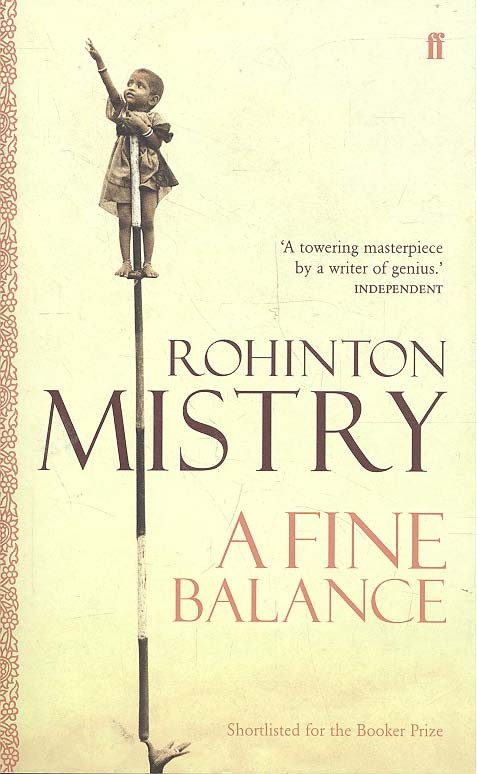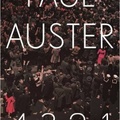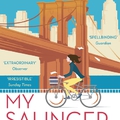Rohinton Mistry: A Fine Balance

While I was reading this novel, I wasn’t pestered by thoughts which often surface in my mind when I’m reading Indian fiction. I mean: I wasn’t constantly thinking that the book is very good but somehow it’s not real enough because it only deals with a small (and often privileged) segment of Indian society while I would definitely be interested in the other segments as well. A Fine Balance is as real as a novel can get, it doesn’t wrap up everything in a fine veil of magical realism (as does Rushdie’s masterpiece, Midnight’s Children), and it’s not about that special, single person who succeeds (as Aravind Adiga’s less-than-perfect novel, A White Tiger) but about a couple of people out of the tens of millions who do not.
The story (apart from the flashbacks and the epilogue) is set in the middle of the 1970s, during the period of Indira Gandhi’s Emergency when basic human rights were suspended for a while, people were indiscriminately sent to prison, and the government started out on an aggressive town-beautification plan (i.e.: demolishing slums and sending pavement-dwellers to work-camps in a city where there is such a shortage in proper housing that even those are unable to find accommodation who could afford to pay the rent) and a population control program. The background is important because the characters of the novel are very much parts of their environment and history, and the things happening around them in the country greatly affect their lives. However, the background is not that important that the characters get lost among all the descriptions of historical events and the reality of the era, since the novel is principally about people and not history.
At the beginning of the book, Dina, a seamstress lets one room of her apartment to a college student, the son of her former classmate, and starts up a small tailoring business in the other room where she employs two low-caste tailors, and after a while she also puts them up in her flat. The blurb of my copy says that this is a story of four people who end up living in the same flat and whose lives become inextricably linked with one another. This description set some alarms going in my mind because this „four people in difficult situations – one flat – common fates” setup very much reminded me of the basic setup of Anna Gavalda’s terrible kitsch novel, Hunting and Gathering, so I kept hoping that this novel wouldn’t be something like that. Well, as it turned out, it’s nothing like that at all.
In the first parts of the novel we get to know the back-story of the four main characters: we learn how Dina, a once promising student aiming to train as a doctor ended up as a lonely, penniless widow who must grab every opportunity to keep her independence; we learn why the two low-caste tailors were forced to leave their homes and start everything again in the big city; and we also learn why the young college student boarding at Dina’s place felt the need to leave his college hostel and look for alternative accommodation.
At the beginning of the story proper, all four characters are just above the surface, their lives are characterized by that fine balance mentioned in the title, and they just about manage to shift among their inhuman and incredibly corrupt surroundings. However, as is customary with these kind of balances, it doesn’t take much for this situation to change. And when I say it doesn’t take much, I mean almost unbelievably small things. In this novel fates can be changed and lives can be ruined if someone is at the wrong place at the wrong time, or if someone addresses someone else with the wrong words. However, in Mistry’s India, every place, time and word can prove to be wrong anytime for the vast majority of people, meaning that no-one can be so careful as to be able to avoid every single dangerous situation. I don’t mean, however, that the characters of the novel are cursed by fate. Their misfortunes and sufferings arise not from the fact that they are who they are (there’s nothing personal in their terrible fates and we cannot say that the whole world conspired against them), but from the simple fact that, say, they happen to be at the place where the police are collecting slum-dwellers to get enough people who attend the prime minister’s speech at a political rally, and they are needed to fill up the quota. (The motif of filling up a specific quota appears several times in the novel, and what I mentioned here is the quota-filler episode which has the smallest consequences on the characters’ lives.)
This is a cruel and unsettling novel, to such an extent that I couldn’t even cry while reading it (to be able to cry, I need at least a small amount of sentimentalism, and this novel doesn’t have any of that). It’s painful to see the defenselessness of the characters, the hopelessness of the task of changing anything, and the all-permeating corruption which makes the whole society function and which makes everybody, and I mean it: everybody corrupt to some extent, because without that, many people simply couldn’t stay alive (of course there are differences – perhaps Dina needs to be corrupt just to stay alive, while the policeman, standing a little higher in the social hierarchy „needs” to be corrupt to be able to pay for the sitar lessons of his daughter, this way improving the girl’s chances when it comes to marriage, and also the chance that his well-married daughter will be able to look after him in his old age – however, the main characters of the novel are not this high in the hierarchy). Of course you can cry out against all the injustices you suffer, you can try to stand up for your basic human rights, you can go against the expectations of your family/caste/society, you can dream about your little private island where you are safe from the cruelty of the world, you can devise your own laws and follow them instead of the old ones (which don’t mean anything during the Emergency, anyway), or you can move to another part of the world, hoping that things will be better there. But in this novel, everyone is defeated in the end, in all these dreams and aspirations. And not because Mistry treats his characters sadistically, but because no other outcome is possible in the reality of this novel.
The story (apart from the flashbacks and the epilogue) is set in the middle of the 1970s, during the period of Indira Gandhi’s Emergency when basic human rights were suspended for a while, people were indiscriminately sent to prison, and the government started out on an aggressive town-beautification plan (i.e.: demolishing slums and sending pavement-dwellers to work-camps in a city where there is such a shortage in proper housing that even those are unable to find accommodation who could afford to pay the rent) and a population control program. The background is important because the characters of the novel are very much parts of their environment and history, and the things happening around them in the country greatly affect their lives. However, the background is not that important that the characters get lost among all the descriptions of historical events and the reality of the era, since the novel is principally about people and not history.
At the beginning of the book, Dina, a seamstress lets one room of her apartment to a college student, the son of her former classmate, and starts up a small tailoring business in the other room where she employs two low-caste tailors, and after a while she also puts them up in her flat. The blurb of my copy says that this is a story of four people who end up living in the same flat and whose lives become inextricably linked with one another. This description set some alarms going in my mind because this „four people in difficult situations – one flat – common fates” setup very much reminded me of the basic setup of Anna Gavalda’s terrible kitsch novel, Hunting and Gathering, so I kept hoping that this novel wouldn’t be something like that. Well, as it turned out, it’s nothing like that at all.
In the first parts of the novel we get to know the back-story of the four main characters: we learn how Dina, a once promising student aiming to train as a doctor ended up as a lonely, penniless widow who must grab every opportunity to keep her independence; we learn why the two low-caste tailors were forced to leave their homes and start everything again in the big city; and we also learn why the young college student boarding at Dina’s place felt the need to leave his college hostel and look for alternative accommodation.
At the beginning of the story proper, all four characters are just above the surface, their lives are characterized by that fine balance mentioned in the title, and they just about manage to shift among their inhuman and incredibly corrupt surroundings. However, as is customary with these kind of balances, it doesn’t take much for this situation to change. And when I say it doesn’t take much, I mean almost unbelievably small things. In this novel fates can be changed and lives can be ruined if someone is at the wrong place at the wrong time, or if someone addresses someone else with the wrong words. However, in Mistry’s India, every place, time and word can prove to be wrong anytime for the vast majority of people, meaning that no-one can be so careful as to be able to avoid every single dangerous situation. I don’t mean, however, that the characters of the novel are cursed by fate. Their misfortunes and sufferings arise not from the fact that they are who they are (there’s nothing personal in their terrible fates and we cannot say that the whole world conspired against them), but from the simple fact that, say, they happen to be at the place where the police are collecting slum-dwellers to get enough people who attend the prime minister’s speech at a political rally, and they are needed to fill up the quota. (The motif of filling up a specific quota appears several times in the novel, and what I mentioned here is the quota-filler episode which has the smallest consequences on the characters’ lives.)
This is a cruel and unsettling novel, to such an extent that I couldn’t even cry while reading it (to be able to cry, I need at least a small amount of sentimentalism, and this novel doesn’t have any of that). It’s painful to see the defenselessness of the characters, the hopelessness of the task of changing anything, and the all-permeating corruption which makes the whole society function and which makes everybody, and I mean it: everybody corrupt to some extent, because without that, many people simply couldn’t stay alive (of course there are differences – perhaps Dina needs to be corrupt just to stay alive, while the policeman, standing a little higher in the social hierarchy „needs” to be corrupt to be able to pay for the sitar lessons of his daughter, this way improving the girl’s chances when it comes to marriage, and also the chance that his well-married daughter will be able to look after him in his old age – however, the main characters of the novel are not this high in the hierarchy). Of course you can cry out against all the injustices you suffer, you can try to stand up for your basic human rights, you can go against the expectations of your family/caste/society, you can dream about your little private island where you are safe from the cruelty of the world, you can devise your own laws and follow them instead of the old ones (which don’t mean anything during the Emergency, anyway), or you can move to another part of the world, hoping that things will be better there. But in this novel, everyone is defeated in the end, in all these dreams and aspirations. And not because Mistry treats his characters sadistically, but because no other outcome is possible in the reality of this novel.





